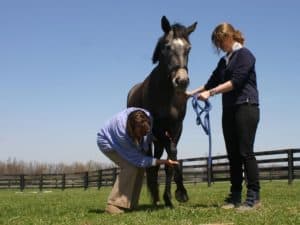Exercise Benefits Senior Horses
Unsoundness and other frailties of old age often call for horses to be relieved of day-to-day performance requirements, but regular exercise remains important for older horses. Exercise comes in many forms—it can be as simple as encouraging aged horses to walk from one end of a field to the other for feed and water, or walk-only lessons or lazy strolls.
Exercise boosts health of aged horses in three important ways. First, it encourages a horse’s musculoskeletal health. A sedentary lifestyle weakens bones, muscles, tendons, and ligaments. Aged horses that are stalled at night often seem especially creaky when turned out, and this is likely due to multiple hours of confinement with only occasional movement. Regular, low-impact movement will help keep joints healthy and reduce lameness.
Second, exercise helps keep the horse’s weight in check. Retirement and obesity frequently go hand in hand. An obese horse is not a healthy horse, and for older horses, excessive weight can be a precursor of endocrine problems, including metabolic syndrome. Light, structured exercise can help ward off unnecessary weight and metabolic difficulties. Many horses that were familiar with daily contact will enjoy the interaction, especially if games or new skills are introduced.
Third, exercise can facilitate colic control. Aged horses have an increased risk of gastrointestinal issues, including colic. Specifically, old horses seem prone to impaction colic, likely associated with decreased motility of the gastrointestinal tract. Horses with dental disrepair may also be predisposed to problems related to half-chewed feed and hay, such as choke or poor digestion of feedstuffs. Access to pasture and grazing will keep older horses moving, which will benefit their joints and their gastrointestinal tracts
Create a free account with TheHorse.com to view this content.
TheHorse.com is home to thousands of free articles about horse health care. In order to access some of our exclusive free content, you must be signed into TheHorse.com.
Start your free account today!
Already have an account?
and continue reading.
Written by:
Kentucky Equine Research Inc.
Related Articles
Stay on top of the most recent Horse Health news with












